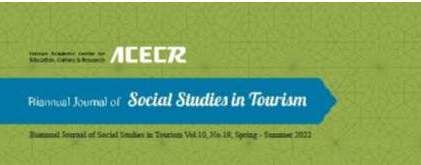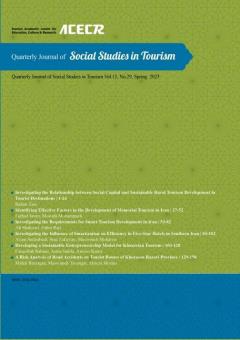Developing a Sustainable Entrepreneurship Model for Khuzestan Tourism
Subject Areas :
Faraj Allah Rahimi
1
*
![]() ,
Asma Salehi
2
,
Asma Salehi
2
![]() ,
Arezoo Kiarsi
3
,
Arezoo Kiarsi
3
![]()
1 - Associate Professor, Department of Management, Faculty of Economics and Social Sciences, Shahid Chamran University of Ahvaz, Ahvaz, Iran
2 - -Master of Business Administration, Faculty of Economics and Social Sciences, Shahid Chamran University of Ahvaz, Ahvaz, Iran
3 - Lecturer, Khuzestan University of Applied Sciences, Ahvaz, Iran
Keywords: Sustainability, Sustainable Entrepreneurship, Tourism, Grounded Theory,
Abstract :
Tourism is recognized as a prominent and dynamic global industry with the potential to generate substantial positive impacts in all nations, particularly in less developed countries, by addressing challenges such as poverty, unemployment, migration, inequality, and even environmental degradation. Consequently, the sustainable development of entrepreneurship within the tourism sector assumes significant importance. In this regard, this qualitative study sought to develop a model of sustainable entrepreneurship within the tourism industry using the grounded theory method. To this end, the required data were collected through semi-structured interviews with 24 managers and experts in entrepreneurship and tourism in Khuzestan province, who were selected via theoretical sampling. The data collection continued until theoretical saturation was achieved. Then, the interview transcripts underwent a three-stage coding process: open, axial, and selective coding. The resultant model was subsequently evaluated by the interviewees using the Delphi method. To assess consensus, a closed-ended questionnaire was developed and administered to the participants, and Kendall's coefficient of concordance was calculated using SPSS software, yielding a value of 0.630, indicating a significant level of agreement and the completion of the Delphi process. The findings of the study, derived from 124 concepts organized into 18 categories and 6 core categories extracted from the interviews, propose a model that elucidates the motivations for engaging in sustainable entrepreneurship in tourism and the factors influencing it. This model offers valuable insights to entrepreneurs, organizations, and related businesses so that they are able to effectively develop and promote sustainable entrepreneurship, enhancing the social well-being of local communities, safeguarding the region's environment, and preserving resources for future generations.
اِسلون، فیلیپ. لگراند، ویلی. سیچن، جوزف. (1395). پایداری در صنعت گردشگری با تأکید بر مهماننوازی. ترجمه حبیب ابراهیمپور، یاور بابایی، الناز سخندان و پرویز پورکریمی. تهران: نشر نور علم.
حسینیزادههرات، زهرا. معینالدین، محمود. حیرانی، فروغ. (1398). طراحی مدل هتلداری سبز سودآور مبتنی بر استراتژی دادهبنیاد. فصلنامه علمی- پژوهشی گردشگری و توسعه. 9(4): 283-269.
ذوالفقاریان، محمدرضا. لطیفی، میثم. (1390). نظریهپردازی دادهبنیاد با Nvivo8. تهران: دانشگاه امامصادق(ع).
شاهد، سیدحسین. رحمانی، بیژن. مرید سادات، پگاه. (1400). تبیین مؤلفههای گردشگری و توسعه کارآفرینی پایدار در نواحی روستایی بخش مرکزی شهرستان همدان. نشریه تحقیقات کاربردی علوم جغرافیایی. 21(60): 399-420.
شرفی، مرضیه. ضیاء. بابک. سمیعی، روحالله. مستقیمی، محمودرضا. (1398). شناسایی عوامل مؤثر در اشتغال با رویکرد کارآفرینی پایدار مبتنی بر سیاستهای کلی اشتغال، ابلاغی از سوی مقام معظم رهبری. فصلنامه مدیریت نوآوری در سازمانهای دفاعی. 2(3): 37-60.
شریفزاده، محمدشریف، عبداللهزاده، غلامحسین. اکبری، مرتضی و مبینیدهکردی، علی. (1395). کارآفرینی و پایداری: به سوی کارآفرینی پایدار. تهران: سازمان جهاد دانشگاهی تهران.
صداقت، مریم. (1400). مدل جامع توسعة پایدار گردشگری جمهوری اسلامی ایران. فصلنامه علمی- پژوهشی برنامهریزی و توسعه گردشگری. 10(36): 288-316.
صلاحیکجور، عظیم. رضوی، سیدمحمدحسین. امیرنژاد، سعید، محمدی، نصرالله، تقیپوریان، محمدجواد. (1400). طراحی الگوی گردشگری هوشمند در صنعت ورزش با رویکرد دادهبنیاد. فصلنامه علمی- پژوهشی گردشگری و توسعه. 10(3): 180-167.
مریدسادات، پگاه. معملوند، شکوفه. (1398). عوامل مؤثر بر توسعه کارآفرینی پایدار گردشگری روستایی (مطالعه موردی: دهستان گلیجان، شهرستان تنکابن). پژوهشهای دانش زمین. 10(40): 91-107.
نداف، مهدی. (1397). مبانی اخلاق حرفهای مدیریت کسبوکار. تهران: مهرگان قلم.
Argade, P., Salignac, F., & Barkemeyer, R. (2021). Opportunity identification for sustainable entrepreneurship: Exploring the interplay of individual and context level factors in India. Business Strategy and The Environment (BSE).30(8): 3528-3551. https://doi.org/10.1002/bse.2818
Eller, J. F., Gielnik. M., Wimmer, H., Thölke, C., Holzapfel, S. Tegtmeier, S., & Halberstadt, J. (2019). Identifying business opportunities for sustainable development: Longitudinal and experimental evidence contributing to the field of sustainable entrepreneurship. Business Strategy and The Environment (BSE). 29(3): 1387-1403. https://doi.org/10.1002/bse.2439
Figueroa-Domecq, C., Kimbu, A., De Jong, A., & Williams, A. M. (2020). Sustainability through the tourism entrepreneurship journey: a gender perspective. Journal of Sustainable Tourism. 28(1): 1-24. https://doi.org/10.1080/09669582.2020.1831001
Glaser, B., & Strauss, A. (2009). The Discovery of Grounded Theory: strategies for qualitative research.New Jersey: Transaction Publishers.
Guden, N., Girgen, M. U., Saner, T., & Yeslilpinar, E. (2021). Barriers to sustainable tourism for small hotels in small island developing states and some suggested remedies. Worldwide Hospitality and Tourism Themes. 13(4): 510-521.http://dx.doi.org/10.1108/WHATT-02-2021-0032
Hariss, R., Griffin, T., & Williams, P., (2002). Sustainable Tourism: A Global Perspective. Elsvier Science Ltd.
Moya‐Clemente, I., Ribes‐Giner, G., & Pantoja‐Díaz, O. (2019). Configurations of sustainable development goals that promote sustainable entrepreneurship over time. Sustainable Development. 28(4): 665-681. https://doi.org/10.1002/sd.2009
Muneeb, F. M., Yazdi, A. K., Wanke, P., & Chughtai, M (2020). Critical success factors for sustainable entrepreneurship in Pakistani Telecommunications industry: a hybrid grey systems theory/ best-worst method approach. Management Decision. 58(11): 2565-2591. http://dx.doi.org/10.1108/MD-08-2019-1133
Nakyejwe Lubowa Kimuli, S., Orobia, L., Muki Sabi, H., & Tsuma, C. K. (2020). Sustainability intention: mediator of sustainability behavioral control and sustainable entrepreneurship. World Journal of Entrepreneurship, Management and Sustainable Development. 16(2): 81-95. https://doi.org/10.1108/wjemsd-12-2019-0096
Nhemachena, C., & Murimbika, M. (2018). Motivations of sustainable entrepreneurship and their impact of enterprise performance in Gauteng Province, South Africa. Business Strategy and The Environment (BSE). 1(2): 115-127. https://doi.org/10.1108/wjemsd-12-2019-0096
Olubusola Odeyemi, Favour Oluwadamilare Usman, Noluthando Zamanjomane Mhlongo , Oluwafunmi Adijat Elufioye, Chinedu Ugochukwu Ike, (2024). Sustainable entrepreneurship: A review of green business practices and environmental impact. World Journal of Advanced Research and Reviews, 2024, 21(02), 346–358
Papaluca, O., Tani, M., & Troise, C. (2020). Entrepreneurship and Sustainability in Tourism: An Interpretative Model. Journal of Management and Sustainability. 10(1): 38-53. http://dx.doi.org/10.5539/jms.v10n1p38
Quantitative approaches Christine Urquhart Research, evaluation and audit: Key steps in demonstrating your value121, 20213.
Rahman Mohammadi, Bijan Abdollahi, Saeed Jafarinia, Akbar Hasanpour, (2023). Designing a sustainable human resource management model whit grounded theory technique (Experimental control: Solico Kalleh Food Industries Group). Journal of Executive Management. Volume 15. Issue 29. Spring and Summer, 2023. Pages 67 to 96.
Soomro, B. A., Almahdi, H. K., & Shah, N., (2020). Perceptions of young entrepreneurial aspirants towards sustainable entrepreneurship in Pakistan. Kybernetes. 50(7): 2134-2154. http://dx.doi.org/10.1108/K-07-2019-0504

